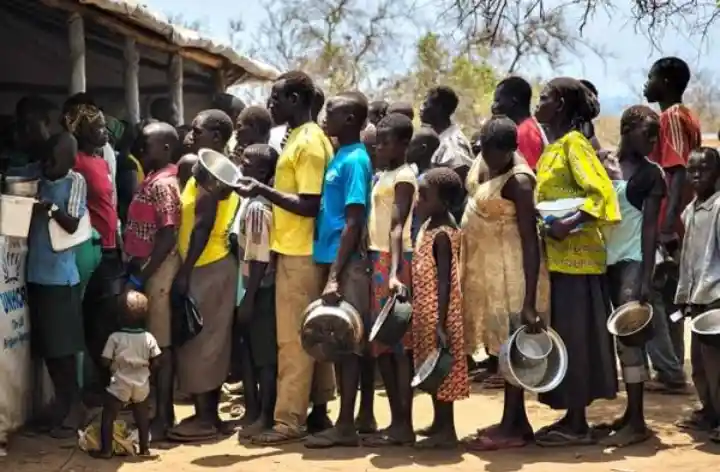More Nigerians Poised to Fall into Poverty by 2027, World Bank Warns
- Advertisement -
Washington, DC / Lagos — The World Bank has issued a stark warning that Nigeria’s hard-won gains in poverty reduction could reverse over the next five years. In its latest Africa’s Pulse report, released during the Spring Meetings of the International Monetary Fund and the World Bank in Washington, DC, the Bank projects that Nigeria’s poverty rate will climb by 3.6 percentage points between 2022 and 2027, the largest increase among Sub-Saharan Africa’s resource-rich and fragile economies.
Modest Growth, Mounting Vulnerabilities
Despite a modest uptick in non-oil activity in late 2024, Nigeria remains vulnerable to structural headwinds. A slump in global oil prices, persistent inflation above 20 percent, and a naira that has depreciated sharply against the dollar have combined to squeeze household incomes. According to the report:
- Advertisement -
“Poverty in resource-rich, fragile countries—including large economies like Nigeria and the Democratic Republic of Congo—is projected to increase by 3.6 percentage points between 2022 and 2027.”
Pay Attention To BREAKING: Former Deputy Senate President Ovie Omo-Agege Set to Exit APC
This stands in contrast to non-resource-rich peers in the region—such as Kenya and Ethiopia—where robust agricultural exports and economic diversification are projected to cut poverty rates by nearly one percentage point over the same period.
- Advertisement -
Inflation and Currency Pressures
With headline inflation still hovering above 22 percent and food inflation exceeding 30 percent in early 2025, many Nigerian households find their purchasing power eroding rapidly. Imported staples, fuel, and pharmaceuticals have all become more expensive as the Central Bank of Nigeria struggles to defend the naira. The report notes:
“Persistent inflation erodes real incomes, particularly for the urban poor, who spend more than half of their earnings on food and energy.”
- Advertisement -
For families living on less than $2.15 per day (2017 PPP)—the international extreme-poverty line—such price shocks can mean the difference between sending children to school or skipping meals altogether.
Youth Unemployment and Informal Work
Exacerbating the crisis is Nigeria’s chronically high youth unemployment rate—estimated at over 30 percent—and widespread underemployment in the informal sector. Millions of young Nigerians, unable to secure formal jobs or access credit, resort to precarious “side-hustles” or gig work. While these activities may generate nominal income, they rarely come with job security, benefits, or upward mobility.
Weak Social Safety Nets
Nigeria’s social-protection footprint remains one of the region’s thinnest. Although programmes such as the National Social Investment Programme (NSIP) aim to support vulnerable households through cash transfers, their reach has been limited by targeting errors, outdated registries, and irregular funding. The World Bank emphasises that scaling up well-targeted cash transfers and public-works schemes is critical to cushioning the poorest against economic shocks.
- Advertisement -
Regional Snapshot: Nigeria vs. Peers
| Country | Poverty Change (2022–2027) | Key Growth Drivers |
|---|---|---|
| Nigeria | + 3.6 pp | Oil dependence, high inflation, weak safety nets |
| Democratic Republic of Congo | + 3.6 pp | Conflict, fragile institutions |
| Kenya | – 0.8 pp | Diversified agriculture, ICT sector |
| Ethiopia | – 1.2 pp | Infrastructure investment, services |
Voices from the Spring Meetings
Speaking at the report’s launch, Dr. Ngozi Okonjo-Iweala, former Nigerian Finance Minister and current WTO Director-General, stated:
“Nigeria must break its overreliance on oil revenues. Diversifying revenue sources—through broadening the tax base and encouraging digital-economy growth—is fundamental to securing stable funding for social programmes.”
Professor Akinwumi Adesina, President of the African Development Bank, added:
“Inclusive growth is the only pathway to sustainable poverty reduction. Nigeria has the talent and resources to achieve this, but it requires bold policy reforms and improved governance.”
Policy Priorities for Nigeria
To avert a slide back into deeper poverty, the World Bank recommends:
- Revenue Diversification: Expand non-oil tax revenues—such as VAT, property, and digital-services levies—to build a more stable fiscal base.
- Strengthened Social Protection: Scale up well-targeted cash transfers and public-works programmes to reach the poorest communities.
- Expenditure Efficiency: Improve public financial management to ensure funds allocated for health, education, and infrastructure actually reach beneficiaries.
- Anti-Corruption Measures: Enhance transparency in budget execution and procurement to restore public trust and encourage private investment.
- Human Capital Investment: Increase spending on quality education and vocational training to equip youth with skills demanded by emerging sectors.
The Stakes Ahead
With 2027 on the horizon, Nigeria’s policymakers face a narrow window to reverse troubling trends. Failure to adopt the report’s recommendations could lock millions more into poverty, heighten social tensions, and undermine long-term growth. Conversely, decisive action on fiscal reform, social-safety-net expansion, and human-capital development could not only halt the rise in extreme poverty—but begin to chart a path toward more inclusive prosperity.
Original written by Babajide Komolafe & Emma Ujah (Washington, DC)
TJ News Nigeria
- Advertisement -


